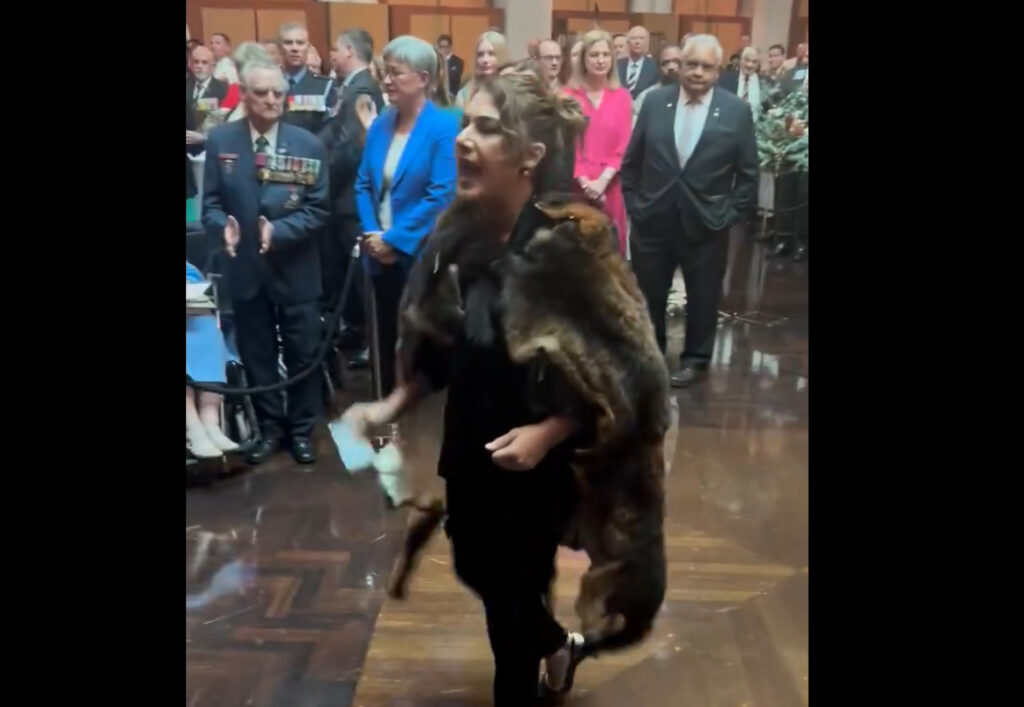Independent Senator Lidia Thorpe recently garnered attention by heckling King Charles during his visit to the Australian parliament. Following his address, Thorpe boldly shouted, “You are not my King!” and demanded the return of Indigenous land by proclaiming, “Give us our land back, give us what you stole.” This outburst prompted security to escort Thorpe out of the venue, highlighting the tension surrounding Australia’s colonial past and the ongoing struggles for Indigenous rights. Thorpe’s actions, while controversial, reflect a larger conversation regarding Australia’s relationship with its monarchy and the recognition of First Nations peoples.
Prior to her heckling, Thorpe demonstrated her dissent by turning her back during the national anthem, “God Save the King,” and was photographed in a possum-fur coat while doing so. This act of protest serves as a visual representation of her stance against the monarchy and its historical ties to colonialism. King Charles, during his speech, attempted to address this sensitive history by acknowledging the contributions and significance of Australia’s First Nations people, emphasizing the impact their cultures and stories have had on his own life. His remarks, although well-intentioned, were overshadowed by Thorpe’s charged reaction and the stark divide between the government’s acknowledgment of Indigenous rights and the sentiments held by some Indigenous leaders.
Thorpe’s history as an activist precedes this event. A former member of the Green Party, she is known for her vocal opposition to Australia’s status as a member of the Commonwealth and her work advocating for Indigenous rights. This intense political activism has won her both supporters and critics, with her previous swearing-in ceremony illustrating the tension between her views and the traditional norms of Australian politics. At that time, she referred to Queen Elizabeth II as “the colonizing Her Majesty,” a comment that reflects her perception of the British monarchy’s role in the oppression of Indigenous peoples.
Australia’s political landscape has increasingly seen discussions around its status as a constitutional monarchy, with many citizens pondering the future of their government structure. Although King Charles is the current sovereign head of state, there is speculation about whether Australia will ultimately choose to sever its ties with the monarchy and embrace a republic. The push for a republic is fueled by a growing awareness of colonial injustices and a desire for a government system that is fully representative of Australia’s diverse population. In this context, Thorpe’s actions can be seen as part of a wider movement advocating for change, equity, and recognition of Indigenous rights.
In light of these developments, comments from King Charles have emerged, suggesting that he would not resist efforts from Australia to transition into a republic. His willingness to adopt a soft approach to discussions about the monarchy indicates a potential shift in how the monarchy engages with former colonies. This posture might foster a pathway toward constitutional change in Australia, reflecting evolving sentiments within the nation regarding its governance and relationship with its colonial past.
Overall, Lidia Thorpe’s protest against King Charles illuminated a pivotal issue within Australian society: the need for acknowledgment and reconciliation with Indigenous peoples. Her actions, while disruptive, spotlight the ongoing struggles and demands for justice that continue to resonate in a country grappling with its colonial legacy. As discussions surrounding monarchy and potential republic status persist, the urgency for addressing and reconciling with Australia’s history is more pressing than ever.

